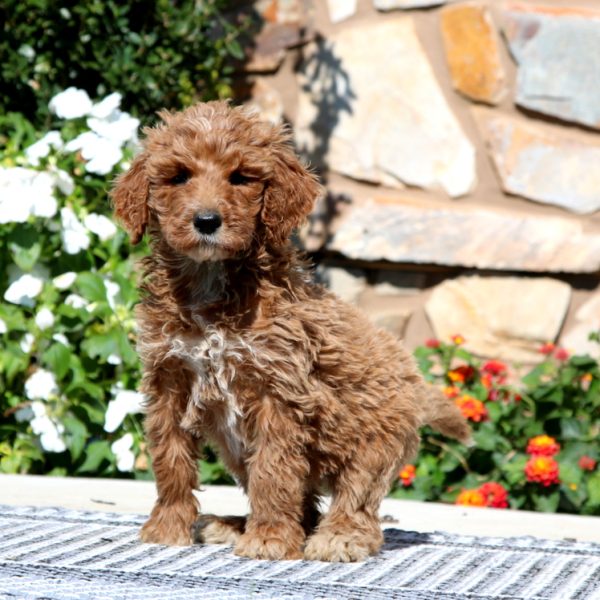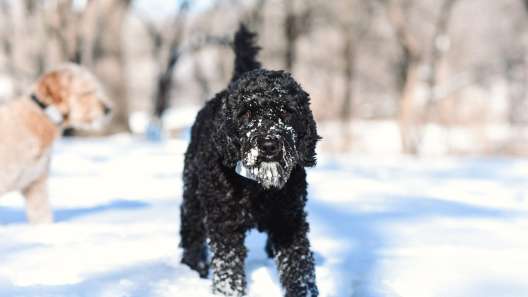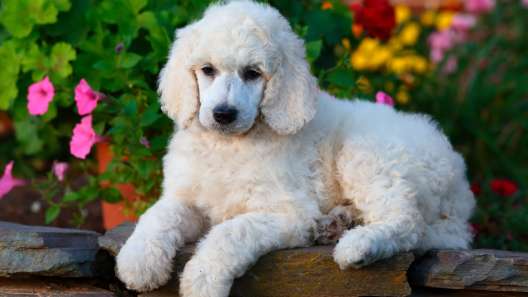
-
Activity Level:
high
-
Shedding Level:
low
-
Grooming Level:
high
-
Trainability:
high
-
Good for Novice Owners:
high
-
Adaptability:
high
-
Kid/Pet Friendly:
often
-
Prey Drive:
low
-
Watchdog:
chill
- Average Size: Medium
- Average Lifespan: 10-15 years
- Registered?: other
Goldendoodle Dog Breed Information
Overview
Temperament
Adaptability
Health
Owner Experience
Grooming
Activity Level
Size
Life Span
Did You Know?
The Goldendoodle is a cross between a Golden Retriever and a Standard Poodle, a Goldendoodle and one of the original parent breeds, or two Goldendoodles. The Goldendoodle originated in the 1990s in North America and Australia, although it was first bred in 1969.
The idea was to create a breed with the great temperament of the family-friendly Golden Retriever along with the intelligence and non-shedding coat of the Poodle. By crossing these breeds, it was also thought that an effective solution for guide/service dogs for people who also had allergies could be created. This cross resulted in highly trainable canines that always aim to please.
Although they are not recognized by the American Kennel Club, they are recognized by other notable canine registries and clubs. The American Canine Hybrid Club, International Canine Association, and more recognize the Goldendoodle.
The Goldendoodle is a lovable, affectionate family dog that makes a wonderful companion. These dogs love nothing more than being around their favorite people and receiving attention and affection from them.
Well-socialized, they are known for getting along fantastically with children, other dogs, and other pets. They even tend to be open and friendly with strangers. After all, everyone is a potential friend to play with and another person to get attention and praise from.
Goldendoodles are highly adaptable dogs. Although their energy tends to make them a better fit for homes with yards where they can run, they can adapt to apartment living. You will just need to make sure to dedicate a lot of time every day to giving them the exercise, mental stimulation, and attention they need to be happy and healthy.
Their coats offer them some extra protection against the cold, but you may still need to bundle up with some winter dog products to stay warm while out on walks during the winter. As with any dog, they are sensitive to heat. Because these dogs bond so closely with their families and tend to be very social, they do not like to be left alone for long periods of time.
Potential health concerns to be aware of in Goldendoodles can include elbow dysplasia, hip dysplasia, von Willebrand’s disease, progressive retinal atrophy, and heart disease. Good breeding practices and the health of the parents make a big difference in the health of Goldendoodle puppies.
Reputable breeders will screen their dogs to make sure they are not passing preventable issues to puppies. Make sure you are asking questions and talking to the breeder about the health and genetic history of both parents.
You can also ask about any health screenings, tests, or clearances that have been done. A willingness to answer questions, transparency about their breeding practices, and knowledge about the breed are all qualities to look for in a great breeder.
Goldendoodles are highly intelligent dogs that pick up things quickly and are eager to please. This makes them a good fit for owners of all experience levels. They are even considered one of the best dog breeds for first-time owners. They are also sensitive dogs that are in tune with their owners. This also tends to make them sensitive to tone of voice.
Consistent training with clear expectations that is focused on positive reward and praise works the best with these sensitive dogs. Harsh tones or corrections damage the bond you are trying to build with them and can result in a dog that does not trust you and does not respond to you.
Although Goldendoodles are meant to inherit the non-shedding Poodle coat, this does not make their grooming low maintenance. Like Poodles, you will need to brush a Goldendoodle’s coat every day to remove tangles and prevent mats. You will also need to take them to the groomer every 4-6 weeks.
In addition to coat care, you will also need to take care of your Goldendoodle’s nails, ears, and teeth. Cutting nails once or twice a month keeps them from growing too long and causing issues. Weekly ear checks, along with careful cleanings as needed, can help prevent ear infections. Brushing teeth every day, along with cleanings at the vet when needed, is a good start for dental care for dogs and goes a long way in preventing painful dental diseases later in life.
Although some Goldendoodles may sit in a more moderate range, most of them are high-energy dogs. Daily walks plus playtime, time to run, and other activities are usually enough for these dogs, but they will likely be up for more activity if you are, especially if it means they will get to spend more time with you.
These dogs are athletic and versatile, so they tend to enjoy a wide variety of activities and dog sports. Just make sure puppies finish growing and have been cleared for higher-impact activity by the vet first. This will help avoid damage to developing bones and joints.
Fully-grown Goldendoodles usually stand 20-26 inches tall at the shoulder and weigh 40-90 pounds. The eventual size of Goldendoodle puppies is greatly determined by the size of the parents.
Goldendoodles generally live for 10-15 years on average.
A Goldendoodle is also sometimes referred to as a Groodle.









